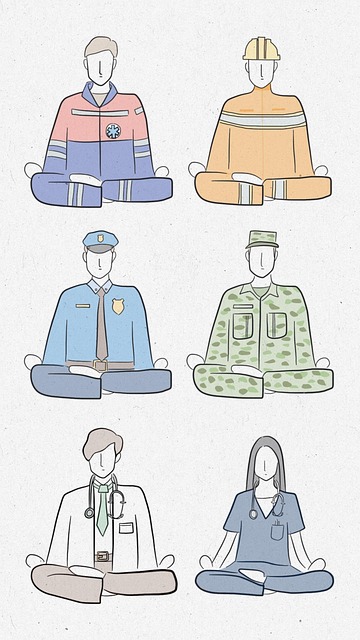Effective facilitation in Denver Drug Abuse-Substance Abuse Therapy settings prioritizes understanding group dynamics, creating an inclusive environment through cultural sensitivity and active participation. Key strategies include clear boundary setting, confidentiality, active listening, and interactive techniques like icebreakers and role-playing to engage participants. Facilitators employ Emotional Well-being Promotion Techniques and tailored Communication Strategies, fostering trust and sharing experiences within the group. Measuring success involves tracking personal growth journeys, celebrating small wins, and using structured assessments while creating a safe space for self-reflection and connection. These methods enhance resilience against substance abuse, promote holistic healing, and support individuals in overcoming challenges.
In the heart of Denver, where mental wellness is a priority, effective group facilitation techniques play a pivotal role in enhancing therapeutic outcomes. This article explores dynamic strategies for leading support groups, focusing on creating safe spaces and engaging participants through interactive activities. We delve into addressing sensitive issues like substance abuse, measuring progress, and fostering personal growth. By understanding group dynamics, facilitators can revolutionize mental health care, offering transformative experiences akin to Denver Drug Abuse-Substance Abuse Therapy.
- Understanding Group Dynamics for Effective Facilitation
- Building a Safe and Supportive Environment
- Engaging Participants: Interactive Techniques for Mental Wellness Groups
- Addressing Substance Abuse Issues within Group Settings
- Measuring Success and Facilitating Personal Growth
Understanding Group Dynamics for Effective Facilitation

Understanding group dynamics is a cornerstone for effective facilitation, especially in settings like Denver Drug Abuse-Substance Abuse Therapy. Groups are diverse, each member bringing unique experiences, perspectives, and needs. A skilled facilitator must navigate this dynamic tapestry, fostering an inclusive environment that encourages open communication and mutual support. By recognizing individual differences and promoting active participation, facilitators can create a safe space where members feel valued, leading to enhanced engagement and therapeutic outcomes.
Cultural sensitivity in mental healthcare practice plays a pivotal role in this process. Facilitators should undergo healthcare provider cultural competency training to understand the diverse backgrounds of group members, ensuring inclusive language and non-judgmental attitudes. This approach not only prevents burnout but also strengthens the bond among group members, fostering deeper connections and more meaningful interactions. Effective facilitation requires a nuanced understanding of these dynamics, ultimately enriching the therapeutic experience in Denver Drug Abuse-Substance Abuse Therapy settings.
Building a Safe and Supportive Environment

Creating a safe and supportive environment is a cornerstone of effective mental wellness group facilitation. In the context of Denver Drug Abuse-Substance Abuse Therapy, fostering such an atmosphere encourages open communication and builds trust among participants. This is achieved through establishing clear boundaries, ensuring confidentiality, and promoting active listening. Facilitators should create a non-judgmental space where individuals feel comfortable sharing their experiences without fear of stigma or recrimination.
Integrating techniques from Stress Management Workshops Organization can enhance this process. By incorporating activities that encourage empathy, understanding, and self-care, facilitators help participants develop inner strength and resilience. This not only aids in managing stress but also equips them with tools to navigate life’s challenges more effectively. Ultimately, a supportive environment is the ideal setting for resilience building and inner strength development within these therapy groups.
Engaging Participants: Interactive Techniques for Mental Wellness Groups

Engaging participants is a cornerstone of effective mental wellness group facilitation. Interactive techniques are vital to fostering an inclusive and supportive environment that encourages active involvement. In Denver drug abuse-substance abuse therapy settings, facilitators can use icebreakers, small group discussions, and role-playing exercises to help members feel more comfortable sharing their experiences. These methods not only break the ice but also promote peer-to-peer learning, enhancing the overall therapeutic effect.
Designed with a focus on Mental Health Education Programs, these interactive sessions can include Stress Reduction Methods and Conflict Resolution Techniques. By incorporating activities that address common challenges like stress management and interpersonal conflicts, facilitators empower group members to develop coping strategies. This active engagement ensures that participants not only gain knowledge but also apply it in real-world scenarios, fostering a sense of agency and community within the group setting.
Addressing Substance Abuse Issues within Group Settings

In group settings, addressing substance abuse issues requires a delicate balance of support and structure. As a facilitator in Denver, facilitating effective recovery involves employing both Emotional Well-being Promotion Techniques and Communication Strategies tailored to this specific population. Group members can benefit from sharing experiences, building trust, and gaining insights into their addiction through compassionate peer interactions. This fosters a sense of belonging and understanding, crucial for overcoming isolation often associated with substance abuse.
Using Compassion Cultivation Practices, facilitators create a safe space where individuals feel heard and validated. This approach encourages open dialogue about challenges and successes in recovery, reinforcing positive behaviors and offering alternative coping mechanisms. By integrating these strategies, group sessions become powerful tools for personal growth, promoting emotional well-being and fostering resilience against substance abuse.
Measuring Success and Facilitating Personal Growth

Measuring success and facilitating personal growth are integral aspects of effective mental wellness group facilitation. Success in this context isn’t merely about achieving specific milestones but rather observing participants’ journeys toward improved well-being. This involves tracking progress, setting achievable goals, and celebrating victories, no matter how small. By employing structured assessment tools and qualitative feedback mechanisms, facilitators can gain valuable insights into each individual’s experience, tailoring interventions accordingly to address unique needs.
Facilitating personal growth within these groups requires creating a safe, supportive environment that encourages self-reflection, vulnerability, and meaningful connection. Through interactive activities, open discussions, and shared experiences, participants develop resilience, build inner strength, and challenge the Mental Illness Stigma Reduction Efforts prevalent in society. By fostering an atmosphere of acceptance and understanding, facilitators enable individuals to explore their emotional landscapes, cultivate coping strategies, and discover their inherent capabilities, ultimately preparing them to navigate life’s challenges with enhanced confidence and adaptability—a valuable asset in overcoming Denver Drug Abuse-Substance Abuse Therapy and promoting holistic healing.
Group facilitation techniques play a pivotal role in enhancing mental wellness, particularly in addressing substance abuse issues. By understanding group dynamics and creating safe spaces, facilitators can engage participants effectively through interactive methods. This approach not only fosters personal growth but also offers a supportive environment for those struggling with addiction, such as in Denver drug abuse cases. Measuring success involves tracking individual progress and ensuring the group’s overall well-being, ultimately revolutionizing substance abuse therapy.














